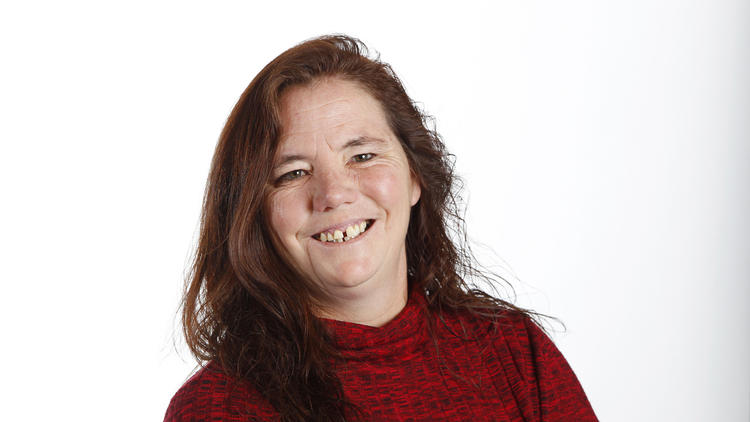via Lisa Deaderick at the The San Diego Union-Tribune

Maggie McWhorter, Executive Director of the Oceanside outreach and drop-in center of StandUp For Kids, a national nonprofit to help homeless youths. (Eduardo Contreras / San Diego Union-Tribune)
When Maggie McWhorter started volunteering with StandUp For Kids 10 years ago, she didn’t realize that youth homelessness was an issue.
“When I went to orientation and learned that there were homeless kids out there, which for me was just shocking, I felt compelled to learn more and do more,” she says.
She started out at just a few hours each week, but as she noticed more ways she could help out, she took on more responsibilities. Those responsibilities eventually grew to her current role as Executive Director of the national nonprofit’s Oceanside outreach/drop-in center, where she oversees the whole program, from implementing policies and the mission, to keeping her center financially stable through fundraising.
StandUp For Kids started in San Diego in the 1990s and has grown across the country, providing outreach, mentoring and apartment support for youths who’ve run away or are homeless. According to the 2016 Point-in-Time Count from the San Diego County Regional Task Force on Homelessness — a quick look at the size of the homeless population during a specific time during the year — there were 830 homeless youths younger than 24 in the county and 667 homeless people of all ages in Oceanside.
McWhorter, 41, lives in Oceanside and has a 17-year-old son, and works full time as a manager with Coca-Cola Refreshments. She took some time to talk about the support StandUp For Kids offers to local youths, her early experiences volunteering for the organization and what the kids say they find most helpful.
Q: How were you introduced to StandUp For Kids?
A: My roommate (at the time) was working on a project for work and needed to find out about places in North County to volunteer and StandUp came up during her research. The mission piqued our interest because neither of us knew that there was a problem with youth homelessness, so we decided to attend the orientation and find out more. We discovered that the program would not work for her clients to volunteer at due to the hours, but that it fit nicely into our schedule.
Q: What made you continue volunteering?
A: The kids drive me. No matter how tough things get for me and how bad a day I’m having, when I walk through those gates at StandUp, my outlook on my day changes. These kids who struggle for the basics come in every night and are smiling and happy to see me, and that makes me happy. To know that just my mere presence brings light to someone’s day is an amazing feeling that can’t be explained in words. To watch these kids grow and regain trust in society, and to achieve what they believe is the impossible, is something that still, after 10 years, surprises me every time it happens.
Q: What compelled you to take on this leadership position as Executive Director?
A: It just kind of happened. When I started volunteering, I really didn’t expect to become this involved. The commitment of being at the center three hours a week seemed like I all I could handle at the time. As time went on, I just noticed things that needed to get done: food packs needed to be made, and clothes needed to be sorted. I had time on the weekends and thought, “Why can’t I come in and do some of these things that can’t get done when the kids are here?” It just grew from there … As time went on and people left, my role as Executive Director just kind of happened.
What I love about Oceanside…
The fact that we are inches from the gates of one of the largest military installations means we have residents from all walks of life with a number of perspectives and outlooks.
Q: What was your very first night as a volunteer like?
A: My first month was the same as my first night. Volunteers only volunteer one night a week and I remember standing in the shadows and watching as kids came in and were greeted by the volunteers. They signed up for chores and immediately went to eat dinner. I remember no one talked to me, they just looked at me and you could see the distrust. We were told during orientation that it would take time for the kids to trust us, so I expected this. I spent my first four Wednesdays in the shadows just watching and being watched. On my fifth week, a kid finally approached me and asked me my name. This was the moment I realized that I was now part of the trusted few and had made it into their circle.
Q: Was there anything you were surprised by when you first started volunteering?
A: The thing that surprised me the most was the appearance of the kids. I had expected to see kids who fit my ideology of what homelessness “looks like,” and instead I saw kids that looked like every other kid I knew. They weren’t wearing trench coats and layers of clothes while pushing shopping carts. They were just teens that easily would blend into any high school in the country.
Q: What are some of the programs you offer that seem to get the greatest response?
A: We offer the basics … we don’t want to recreate the wheel; there are a number of organizations in San Diego doing the same work we do every day. We want to be a resource center for our kids, a place to call home, even if for only a couple hours a night. A place of trust and assistance, a place where relationships are formed so that we can help the kids utilize the resources that are available for them within the community. Our greatest needs are the basics: food, clothing and shelter, like sleeping bags and tents.
Q: Why do you think that’s the case?
A: I think that when our basic needs fail to be met, we cannot focus on improving our situation. Once we solve the need, then we can get to the root of what is causing the youth to be homeless or at-risk, and begin the process of changing their lives completely.
Q: What do you wish people understood about the people you help, and about homelessness in general?
A: That the kids truly want a chance to succeed; they have dreams and aspirations like any other kids their age. That being homeless does not always result from drug use or lack of effort. It’s often times no fault of the individual and once you find yourself homeless and society begins to look down on you, climbing your way out can become an impossible mission.
Q: Are there any stories that stand out from over the years?
A: We had a family of five siblings who were staying in a local motel with their mother. The oldest was the first to come to StandUp, then, gradually, he would bring his other siblings until we had all five of them coming on a nightly basis while their mother waited outside of the center until we closed. These kids just needed a place to feel welcome, a place where no one judged them based on their situation, and they found it with us. We have watched all five of these kids grow up and become successful. Three of the five have married, found jobs and started families of their own. The other two are focused on their careers and building their independence before settling down and starting a family.
Q: What do you hear most from the kids about what they find most helpful?
A: One thing that stands out more than anything is that StandUp gives them a sense of belonging. It doesn’t matter what brings them to us, they know that they belong. Every night that we are open, they can count on any one of our volunteers to make them feel like family. After our kids age out at 22, they continue to come back and give us updates on how they are doing and to thank each volunteer for helping them during a rough spot in their lives.
Q: What have you learned about yourself as a result of this work?
A: I think the biggest thing I’ve learned is that I am more patient than I thought I was. When I first came to StandUp, I was the type of person who needed instant gratification. There was a reaction to every action. What I have learned is that patience is a virtue.
Q: What is the best advice you’ve ever received?
A: The Executive Director before me always used to say, “No matter what you do, always lead with the kids. When making decisions or changing the program, take a moment and ask yourself, ‘Is this in the best interest of the kids?’ If the answer is ‘Yes,’ proceed.” I think that has stuck with me the most.
Q: What is one thing people would be surprised to find out about you?
A: That my son is attending high school abroad in Italy while his dad is stationed there on military orders.
Q: Describe your ideal San Diego weekend.
A: My ideal weekend would be spending time along the coast just relaxing, people watching and enjoying the craft breweries that are popping up all over the county.

